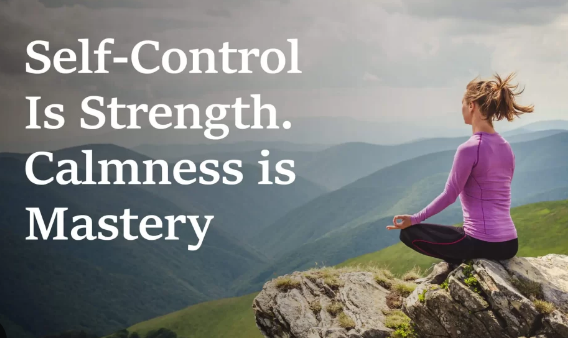Self-Control is Strength. Calmness is Mastery. You – Tymoff
Self-control and calmness are two pillars of strength and mastery that define our ability to navigate through life’s challenges. In the journey of personal growth and self-improvement, mastering these qualities becomes paramount. The philosophy of “you – tymoff” encapsulates the essence of self-control and calmness, guiding individuals towards a path of resilience and inner peace.
Understanding Self-Control
Self-control refers to the ability to regulate one’s emotions, thoughts, and behaviors in the face of temptations and impulses. It involves making conscious decisions that align with long-term goals rather than succumbing to immediate desires. Self-control acts as a shield against impulsivity, enabling individuals to make rational choices even in challenging circumstances.
The Relationship Between Self-Control and Strength
The correlation between self-control and strength lies in the discipline it instills within individuals. By exercising self-control, individuals cultivate resilience and perseverance, essential qualities for overcoming obstacles. Strength, in this context, is not merely physical but also encompasses mental fortitude and emotional stability.
Calmness: The Essence of Mastery
Calmness is the state of inner tranquility amidst external chaos. It involves maintaining composure and clarity of mind, regardless of the circumstances. Mastery over calmness empowers individuals to navigate through life’s uncertainties with grace and poise.
You – Tymoff Philosophy
The philosophy of “you – tymoff” emphasizes the significance of self-awareness and introspection in fostering self-control and calmness. It encourages individuals to embrace their innate strengths and weaknesses, paving the way for personal growth and development.
Strategies to Cultivate Self-Control
Practical techniques such as mindfulness practices, goal setting, and delayed gratification aid in strengthening self-control. By cultivating mindfulness, individuals become more attuned to their thoughts and emotions, enabling them to make conscious choices.
Techniques for Achieving Calmness
Various relaxation techniques, including deep breathing exercises, meditation, and visualization, promote a sense of calmness and inner peace. These practices help individuals detach from stressors and cultivate a state of serenity amidst life’s turbulence.
Overcoming Challenges in Self-Control
Dealing with temptations and managing stress are common challenges on the path to self-control. By developing coping mechanisms and adopting healthy habits, individuals can effectively navigate through obstacles and maintain their resolve.
The Art of Mastering Calmness
Mastering calmness involves embracing acceptance and letting go of control over external circumstances. By cultivating emotional intelligence and resilience, individuals develop the capacity to respond to challenges with equanimity and grace.
The Power of Self-Reflection
Self-reflection fosters self-awareness and enables individuals to learn from past experiences. By critically evaluating their actions and decisions, individuals gain insights into their thought patterns and behaviors, facilitating personal growth.
Embracing Change and Growth
Flexibility in mindset and adaptability to change are essential components of mastering self-control and calmness. By embracing uncertainty and viewing challenges as opportunities for growth, individuals develop resilience and thrive in dynamic environments.
Practical Applications in Daily Life
Applying self-control in decision-making and incorporating calmness in stressful situations enhance overall well-being. By practicing mindfulness in everyday activities and prioritizing self-care, individuals foster a sense of balance and harmony in their lives.
Benefits of Self-Control and Calmness
The benefits of self-control and calmness extend beyond personal fulfillment to encompass improved focus, productivity, and emotional well-being. By nurturing these qualities, individuals enhance their relationships, achieve their goals, and lead fulfilling lives.
Case Studies and Success Stories
Real-life examples of individuals who have exemplified self-control and calmness serve as inspiration for others. From athletes overcoming adversity to entrepreneurs navigating challenges, these stories highlight the transformative power of resilience and inner strength.
Conclusion
In conclusion, self-control is the foundation of strength, while calmness is the hallmark of mastery. By embracing the philosophy of “you – tymoff” and incorporating practical strategies into daily life, individuals can cultivate these qualities and navigate through life’s ups and downs with resilience and grace.
FAQs
- How can I improve my self-control?
- Practice mindfulness and self-awareness techniques.
- Set clear goals and establish a routine to stay disciplined.
- What are some effective ways to achieve calmness?
- Engage in relaxation exercises such as deep breathing and meditation.
- Take breaks and prioritize self-care to reduce stress levels.
- How do self-control and calmness contribute to success?
- Self-control enables individuals to make informed decisions and stay focused on their goals.
- Calmness facilitates clarity of thought and enhances problem-solving abilities.
- What role does resilience play in mastering self-control and calmness?
- Resilience enables individuals to bounce back from setbacks and maintain their composure in challenging situations.
- Can self-control and calmness be learned?
- Yes, both qualities can be cultivated through consistent practice and self-reflection.




